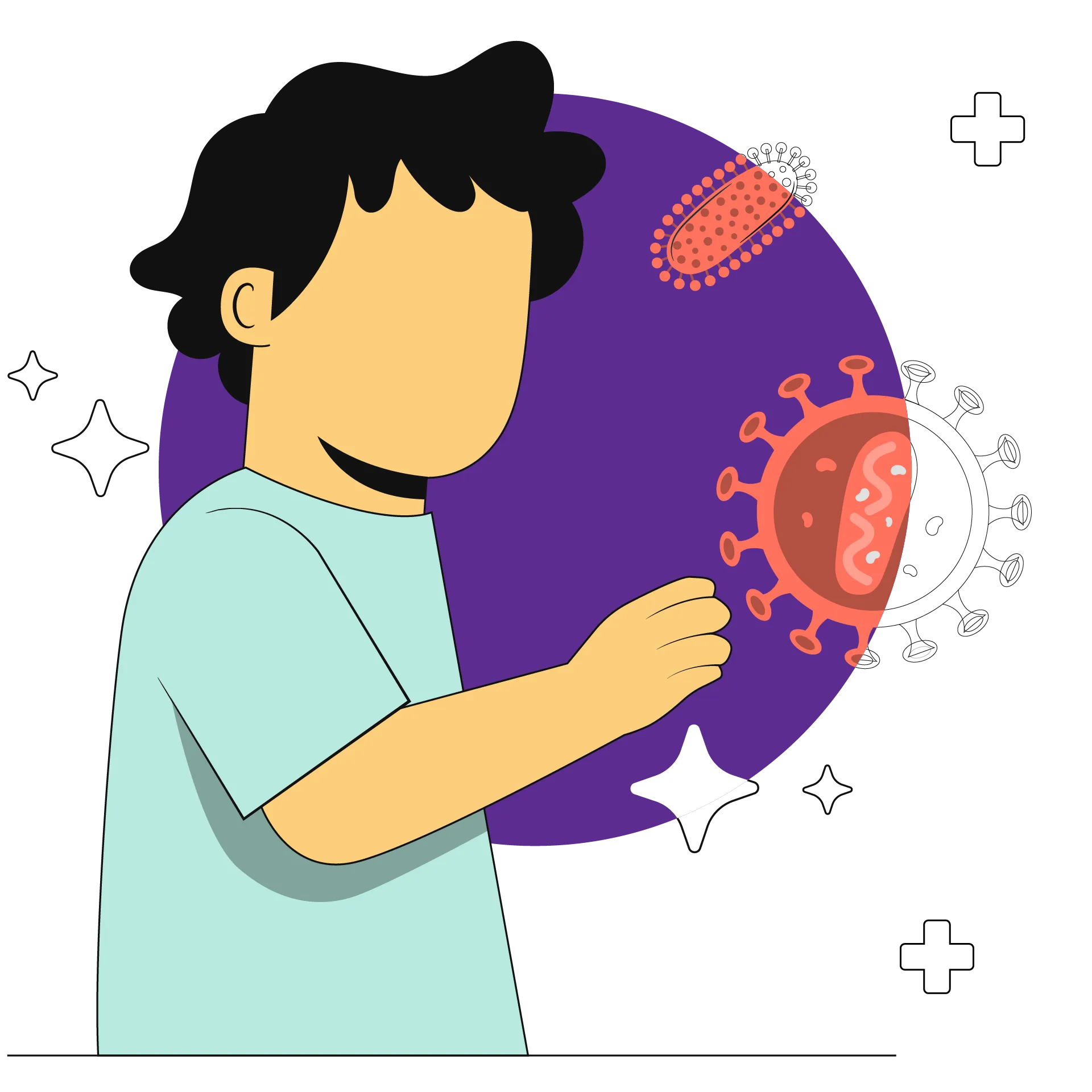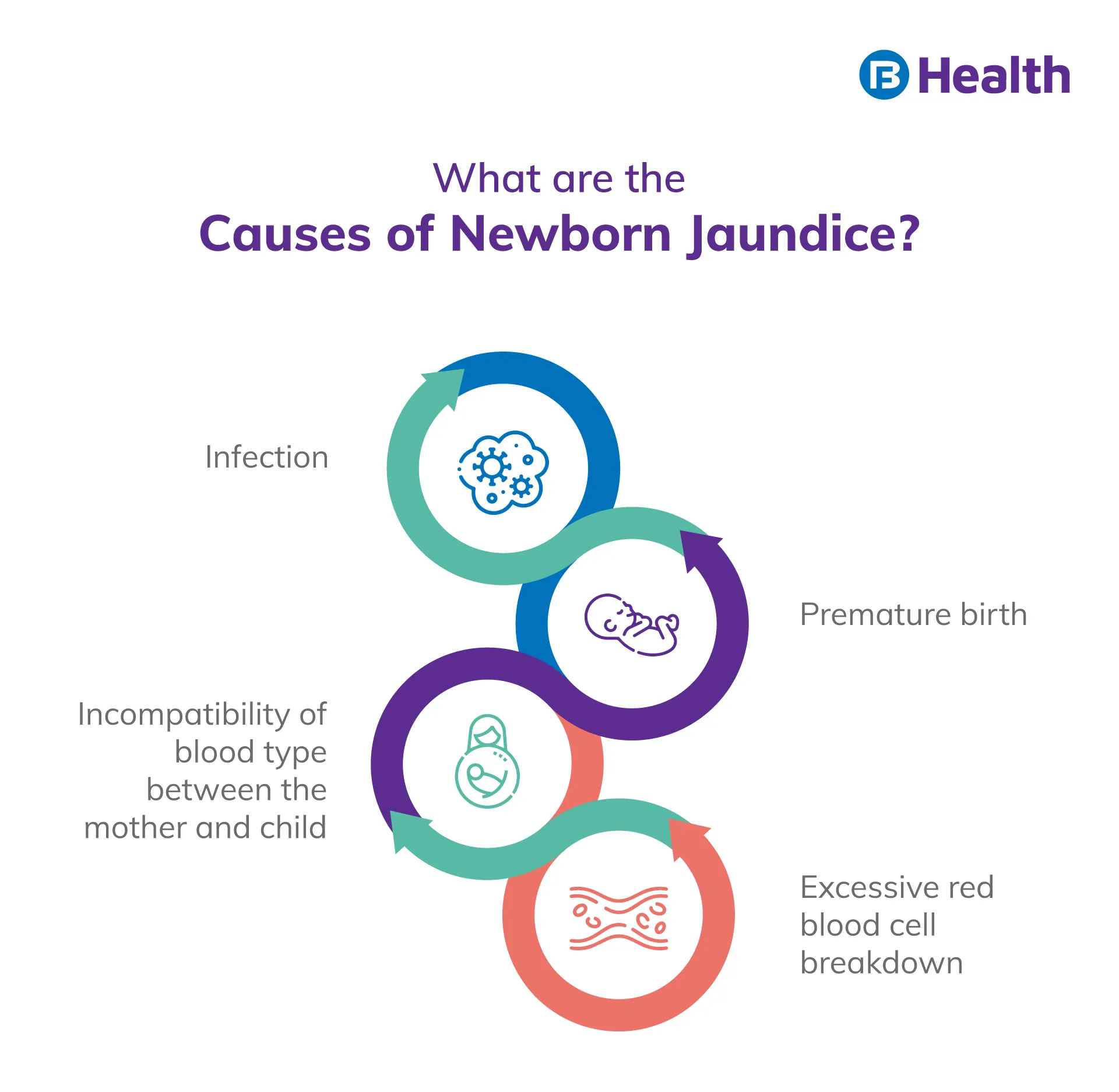Paediatrician | 5 min read
Newborn Jaundice: Causes, Prevention and Diagnosis
Medically reviewed by
Table of Content
Synopsis
Newborn jaundice is a condition in which a newborn's skin and the whites of their eyes look yellow [1]. Jaundice is usually harmless and can be treated easily, but it may be a sign of a more serious condition in rare cases. For this reason, it is important to watch for signs of jaundice if you are concerned about your jaundiced newborn's bilirubin levels.
Key Takeaways
- Excess of bilirubin in the blood can lead to a yellowing of the skin and eyes and cause newborn jaundice
- Treatment for newborn jaundice usually involves phototherapy, a type of light therapy that helps break down bilirubin
- If you are unsure of your newborn's jaundice and symptoms, consult with a doctor immediately
What's Newborn Jaundice?
Newborn jaundice is a condition that affects about 60%[3] of all newborn babies. It is a condition in which a newborn's skin and the whites of the eyes look yellow. This ailment is caused by excess bilirubin, a yellow pigment produced when red blood cells break down. Bilirubin is usually excreted in the stool, but a newborn's liver is not fully developed, so the bilirubin can build up in the blood. Jaundice is common and usually nothing to worry about. It's usually harmless and will go away within a few weeks. In rare cases, though, jaundice can be a sign of a more severe condition, such as liver disease or blood disorders.
Normal bilirubin levels in newborns usually vary between 5 and 20 mg/dL [1]. If a newborn's bilirubin levels become too high, they may require treatment, including phototherapy. Newborn jaundice can be treated with phototherapy, in which the newborn is exposed to special lights[4] that help break down the bilirubin.Its cases may rarely need to be hospitalized for treatment. Bilirubin levels in newborns can be monitored using a simple blood test. If levels are elevated, treatment may be necessary. Treatment options include phototherapy.
What Causes Newborn Jaundice?
There are many different causes of newborn jaundice. Sometimes, it may be due to a genetic disorder or an underlying medical condition. In other cases, it may result from something as simple as a missed feeding or dehydration.
Several things can cause newborn jaundice, including:
- Premature birth
- Incompatibility of blood type of mother and child
- Excessive red blood cell breakdown
- Infection
Symptoms of Newborn Jaundice
In newborn jaundice, if bilirubin levels become too high, it can cause brain damage; this is why it is essential to watch for signs of jaundice and to talk to a doctor if you are concerned.
Newborn jaundice symptoms include:
- Yellow skin
- Yellow whites of the eyes
- Dark urine
Newborn Jaundice Diagnosis
Most cases of newborn jaundice are mild and go away on their own. But in some cases, it can be severe and require treatment. If you think your child has newborn jaundice, it's important to see a doctor right away.
It is usually diagnosed with a physical exam. The doctor will look for signs of yellowing in the skin and eyes. They may also ask about any other symptoms your child is having. If the doctor suspects newborn jaundice, they may recommend a blood test to measure.
It is diagnosed by examining the newborn's skin and eyes for yellowing. A simple blood test can also measure bilirubin levels in the blood. If bilirubin levels are elevated, further testing may be needed to determine the cause. Doctors may also use a bilirubin meter to measure the bilirubin level in the baby's blood. The blood test is usually done when the baby is between two and four days old. The test results will help the doctor determine if the jaundice is mild, moderate, or severe. Then, the doctor may suggest more tests, such as urine and liver function tests. If these tests indicate that a child has jaundice, the doctor will likely order a follow-up ultrasound to confirm the diagnosis.
Additional Read: Prevention of Jaundice
Newborn Jaundice Treatment
Newborn jaundice treatment can be done in several ways, depending on the cause. If the reason is excess bilirubin, treatment may involve removing it from the blood or using light therapy to break it down. If the cause is an obstruction in the bile ducts, treatment may include surgery to remove the obstruction. In some cases, newborn jaundice may go away on its own without treatment.
Can Newborn Jaundice be Prevented?
Unfortunately, there is no sure way to prevent newborn jaundice. However, there are some steps you can take to lower your baby's risk. These include breastfeeding often and avoiding exposure to cigarette smoke.
Finding the right child health insurance can be a daunting task. There are so many different plans and providers to choose from. Choosing a child insurance plan can be challenging. You need to be aware of your family's requirements to select a suitable plan for them.
Here are a few things to keep in mind when purchasing child health insurance:
- Ensure the plan covers the basics, like doctor's visits, vaccinations, and prescriptions
- Consider your child's age and health needs when choosing a plan
- Find a plan with a good network of doctors and hospitals
- Get quotes from multiple providers before you make a decision
When to Seek Medical Attention for Newborn Jaundice?
Most cases of jaundice are benign and will resolve on their own. However, if the jaundice is accompanied by other symptoms such as fever, vomiting, or lethargy, it may be a sign of a more serious condition, and you should seek medical attention immediately. If you are unsure whether or not your newborn's jaundice is cause for concern, it is always best to err on the side of caution and consult with a medical professional.
If you think your child may have jaundice, it is important to seek medical care as soon as possible. You can get an online doctor consultation from Bajaj Finserv Health to help solve any queries you may have.
References
- https://medlineplus.gov/ency/article/001559.htm#:~:text=Bilirubin%20is%20a%20yellow%20substance,This%20is%20called%20jaundice.
- https://www.netmeds.com/health-library/post/newborn-jaundice-causes-symptoms-and-treatment
- https://www.childbirthinjuries.com/birth-injury/newborn-jaundice/#:~:text=Jaundice%20is%20a%20common%20condition%20that%20affects%2060%25,can%20cause%20permanent%20brain%20damage%20when%20left%20untreated.
- https://pubmed.ncbi.nlm.nih.gov/22108388/
Disclaimer
Please note that this article is solely meant for informational purposes and Bajaj Finserv Health Limited (“BFHL”) does not shoulder any responsibility of the views/advice/information expressed/given by the writer/reviewer/originator. This article should not be considered as a substitute for any medical advice, diagnosis or treatment. Always consult with your trusted physician/qualified healthcare professional to evaluate your medical condition. The above article has been reviewed by a qualified doctor and BFHL is not responsible for any damages for any information or services provided by any third party.






